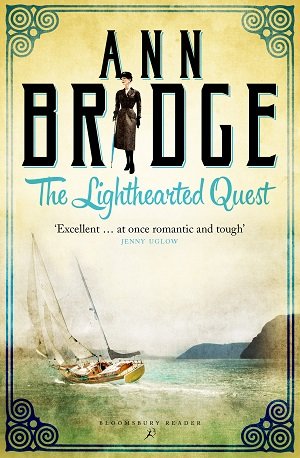 Written by Ann Bridge — Things have certainly changed since the 1950s. With the rise of cheap air travel and global terrorism, along with the internet and Hollywood movies, North Africa is no longer a place of mystery for most English speakers. It sometimes feels like there’s nothing in the world left to uncover, but thankfully Bloomsbury Reader is always unearthing ancient wonders from the world of crime fiction.
Written by Ann Bridge — Things have certainly changed since the 1950s. With the rise of cheap air travel and global terrorism, along with the internet and Hollywood movies, North Africa is no longer a place of mystery for most English speakers. It sometimes feels like there’s nothing in the world left to uncover, but thankfully Bloomsbury Reader is always unearthing ancient wonders from the world of crime fiction.
Ann Bridge’s series of novels featuring dilettante journalist Julia Probyn is one such wonder. Called upon by her aunt to find a wayward cousin so that he can take over the management of the family estate in Scotland, Julia decides to take on the work of amateur detective. Colin Monro has not been heard from for months, with the only clue to his location the authorisation for the transfer of his accounts from London to Casablanca, and a few oblique postcards from ports all over the Mediterranean. Without delay Julia boards a small merchant vessel bound for Tangier, in search of the truth about her cousin Colin.
Armed with only the knowledge that he had been aboard a yacht, transporting bananas and oranges between Iberia and Morocco, Julia sets off to the bars of the Tangier International Zone, the souks and alleyways of Fez, and the hustle and bustle of Casablanca. Everywhere she looks she finds individuals with secrets they cannot help but spill, and opinions they’re all too eager to share. All agree, it seems, that Colin was not engaged in the importation of fruit, but the smuggling of something else, although no-one can quite determine what. Despite her undeniable feminine charms, very few members of Morocco’s international elite will help her willingly.
Her travels take her by train, car and boat up and down the Moroccan coast, always a step or three behind her cousin. While moonlighting as secretary for an elderly archaeologist (a spritely old lady with a beard) she manages to find time to duck off down the country for her journalistic as well as her detective work, but sometimes the clues just seem to appear in front or her, coincidentally. The biggest coincidence is saved for the end and it’s one even the least clued-in reader will see coming. In another novel the all-too-simple connections in the plot line would be hard to forgive, but The Lighthearted Quest is so fun and, well, light-hearted that it’s easy to forgive the occasional wild coincidence.
At times Julia seems too modern for the era she lives in. Upon their release, Bridge’s novels were lauded for the realistic and unsentimental way they portrayed their subject, free from exoticism or overt racism. This doesn’t mean that The Lighthearted Quest is entirely free of cringeworthy moments, like when a group of men in a Tangiers bar are repeatedly described as ‘the pansies’, or the occasional sweeping generalisations about Jews or ‘Moslems’. Despite being closer to Agatha Christie’s Miss Marple in terms of setting, Julia reminds me more of Kerry Greenwood’s Phryne Fisher. Both are attractive, astute female detectives getting around in a man’s world.
I’ve read one too many serial killer novels recently (Ragdoll was the gruesome needle that finally broke the camel’s back for me) so it’s refreshing to read a book that isn’t littered with corpses. It’s also a novel that very successfully achieves exactly what it sets out to do. The Lighthearted Quest is not gory or sensationalised, it’s just pure smart fun, and makes me wonder why it hasn’t been re-released before.
Bloomsbury Reader
Print/Kindle/iBook
£4.68
CFL Rating: 4 Stars









